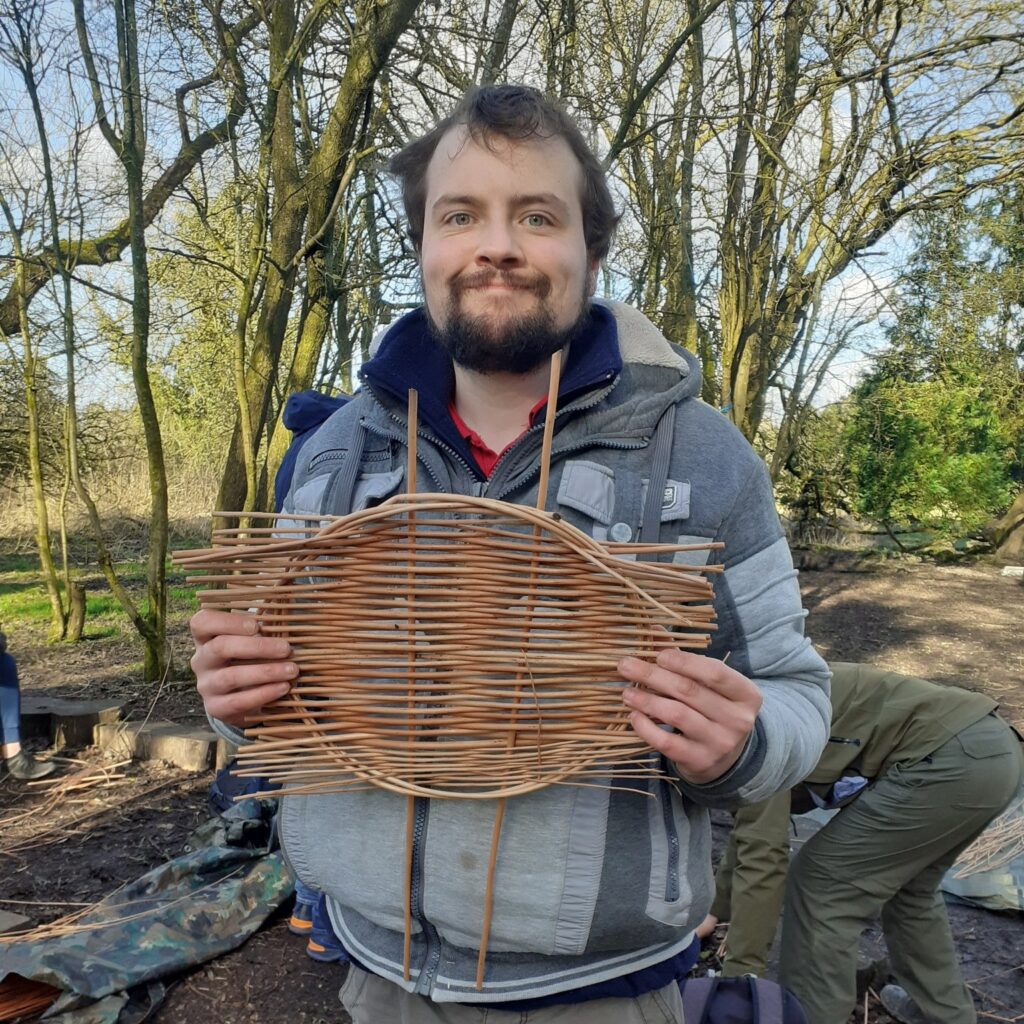
It can be difficult sometimes to get yourself off the sofa, out the house, and into the great outdoors – especially on a typical dreich Glasgow day! But there are so many mental health benefits to spending time in nature, as we at Flourish well know. Studies show that being in nature can improve mood, lower anxiety, and improve cognition and memory!
We have sessions of Forest Craft throughout the year – the autumn sessions have seen us building fires, making bread outdoors, going for walks, and making beads out of rowan berries!
We go out to the allotment three times a week all throughout the year – in the spring we put up a polytunnel to grow all sorts of new vegetables! We were busy over the summer renovating our back garden – replacing the decking, washing and painting the walls, and planting lots of new plants.
Flourish members spend time outside in many different ways. Member Andrew G has written on the many benefits of forest bathing!
Forest bathing, known as Shinrin-yoku in Japanese, is a practice that involves immersing oneself in the natural environment of a forest. Originating in Japan in the 1980s, this practice has gained global recognition for its numerous health benefits. Unlike traditional hiking or nature walks, forest bathing emphasizes a mindful and sensory experience, allowing individuals to connect deeply with nature.
Physical Health Benefits
One of the most significant benefits of forest bathing is its positive impact on physical health. Studies have shown that spending time in a forest can lower blood pressure, reduce heart rate, and decrease levels of the stress hormone cortisol1. The practice also boosts the immune system by increasing the activity of natural killer (NK) cells, which play a crucial role in fighting off infections and cancer, Additionally, the clean, oxygen-rich air in forests can improve respiratory health and overall vitality
Mental Health Benefits
Forest bathing is also highly beneficial for mental health. The serene and calming environment of a forest helps reduce stress, anxiety, and depression4. Engaging with nature in this way promotes mindfulness, allowing individuals to focus on the present moment and detach from the worries of daily life. This mindful engagement can lead to improved mood, enhanced concentration, and better cognitive function
Emotional and Spiritual Well-being
Beyond physical and mental health, forest bathing contributes to emotional and spiritual well-being. The practice encourages a deep connection with nature, fostering a sense of peace and tranquility. This connection can lead to a greater appreciation for the natural world and a sense of belonging within it. Many participants report feeling rejuvenated and more balanced after a session of forest bathing
Practical Tips for Forest Bathing
To fully experience the benefits of forest bathing, it is essential to approach it with the right mindset. Here are some practical tips:

- Choose the Right Location: Select a forest or wooded area that is rich in biodiversity and free from urban noise.
- Disconnect from Technology: Leave your phone and other electronic devices behind to fully immerse yourself in the natural surroundings.
- Engage Your Senses: Pay attention to the sights, sounds, smells, and textures around you. Listen to the rustling leaves, feel the bark of trees, and breathe in the fresh air.
- Move Slowly and Mindfully: Walk slowly and take your time to observe and appreciate the environment. There is no need to rush.
- Be Present: Focus on the present moment and let go of any distracting thoughts or worries.
Conclusion
Forest bathing, or Shinrin-yoku, offers a holistic approach to health and well-being by harnessing the healing power of nature. Its benefits extend beyond physical health to encompass mental, emotional, and spiritual well-being. By incorporating forest bathing into our lives, we can reconnect with nature, reduce stress, and enhance our overall quality of life.
The cycling group are always out and about – from cycling skills sessions in the local park and cycle rides around Glasgow to our summer jaunt around the Isle of Cumbrae! James is a keen cyclist. He says “I feel good about myself when I’m cycling along a path and there’s trees on each side, there’s fresh air and I see things I wouldn’t normally see. When I cycle to Lambhill Stables along the Forth and Clyde Canal it’s an uplifting feeling – it definitely helps my mental health”

We’ve been working with Lapidus Scotland over the last year on a series of writing and creativity workshops – one of these was Walking and Writing. We went walking along the river Kelvin, through Kelvingrove Park where we took pictures, and did some litter picking in nearby Millenium Park – and then wrote poems based on the litter we picked up! Litter picking is a great way to get outside and do something for the community. We also did a series of workshops with poet Gerry Loose called Writing in the Garden. A group of Flourish members went down to Woodlands Community Garden where we did writing exercises based on nature and gardening and came up with loads of great ideas for our own garden redesign.
Try going for a 15 minute walk or even standing outdoors for 5 minutes. If you’re not able to get out and about then try bringing nature indoors! House plants can boost mood – and watching nature documentaries can help you feel more in tune with the natural world. Recently we watched the film Wilding on our big screen and discussed the themes of biodiversity, farming, and letting nature take over! If you need some ideas of outdoor activities have a look at this list from Mind
